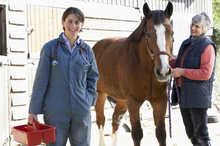Before purchasing a horse, especially a first horse, the would-be owner needs to understand the tremendous responsibility that comes with horse ownership. Certainly, the day-to-day care of a horse takes time, money and commitment, and is not to be taken lightly.

Pre-purchase exam - A Must
People wanting to buy a horse are often attracted to auctions, but buying a horse at auction is a questionable practice for even the most experienced trainer or veterinarian, let alone a first-time buyer.
The single most crucial aspect in finding the right horse is getting the help of someone who has experience in training horses and understands what a horse is all about. This might be a horse trainer, a veterinarian, a farrier, or someone with years of experience working with horses.
People are often attracted to auctions where horses and other livestock are being sold. Auctions are fun to watch and the prices can be tempting. Buying a horse at an auction is a questionable practice for even the most experienced horse person.
You might come home with a good bargain. But, buyer beware: you might come home with a big problem.
Many horses are auctioned because it's difficult to sell them privately.
The ethics that govern a private sale don’t apply to auctions. An experienced horse person might be able to pick out a diamond in the rough, but an auction is not the place to go looking for your first horse.
According to Katherine Blocksdorf of About.com, who has bought and sold a number of horses, here are five top reasons NOT to purchase a horse at an auction:
1. Horses may be drugged
It’s sad but true, but some unscrupulous sellers will give horses calming drugs before an auction. A horse may appear ‘bomb proof’ at the auction, but once the drugs wear off you may have a very difficult and dangerous horse on your hands. Private sellers can drug horses too, but if you suspect drugging this can easily be picked up in a pre-purchase veterinary exam.
2. Horses not as well broke as they appear
I recently saw a horse go through an auction that I knew had been ‘broke’ a few days before. The horse was very quiet as it was ridden through. Why? Because horses are followers and in the confusing atmosphere of the auction it looked to the only place it knew for confidence--its rider. Anyone buying this horse might have thought it very well trained. In reality, it had been barely handled and needed a lot more training and a knowledgeable rider to turn it into a safe, well mannered horse.
3. Horse may have vices or other issues
Vices such as cribbing, weaving, stall walking, refusing to load on a trailer, biting, kicking and a myriad of other undesirable behaviors may not be apparent in the sales pen of an auction. At an auction, the seller often does not have the same obligation to disclose vices as they would through private sale. Many vices are dangerous or destructive.
4. Horses may have health issues
I know of a pony bought at auction that appeared healthy. After purchase the pony showed signs of heaves. It had been medicated to mask the symptoms. The pony required costly medication and during humid weather couldn't’t be ridden.
I also know of an OTTB sent to auction looking perfectly sound despite irreparable bone damage. It was bought by a young family. Imagine their despair on discovering the horse was permanently and painfully lame, with no chance of recovery.
5. A buyer has little chance to try out the horse before buying
If you are buying your first horse the one thing you will want to do is ‘try before you buy’. It’s essential to find out if the horse you are buying is safe and fun for you to ride or drive right away. When you are buying you will want to try a horse out more than once and perhaps compare several that you are considering. At an auction, you probably won’t have a chance to ride a horse and if you do it can be in a very confused and dangerous environment.
In addition to heeding this advice about buying a horse at an auction, a wise buyer is ALWAYS going to have a pre-purchase exam before finalizing any purchase of a horse.
Learn more about Pre-Purchase Exams
